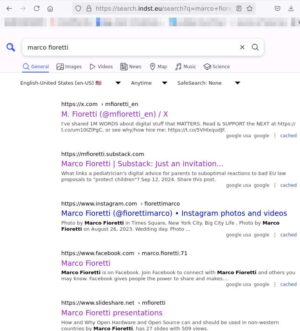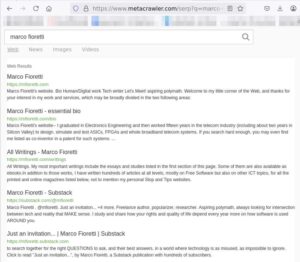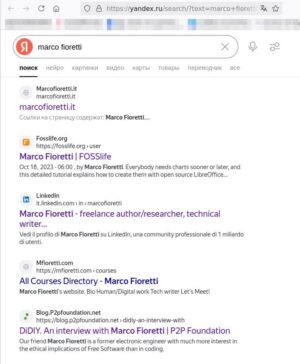The EU’s EuroSearch vision might pave the way for a new search paradigm that will benefit local and regional communities throughout the world.

Among other things, a month ago I wrote that Europe badly needs “search engines that just work.” Since then I’ve discovered that there is something already happening in that space that could have bigger consequences than I initially thought.
Open Web Search
The EU-financed Open WebSearch project that will end in August, aims to develop the basic building blocks of what could be a real European alternative to the likes of Google, Yahoo and Bing. Its most important piece is an “Open Web Index,” built with free and open source software using standards like Apache Lucene, PyTerrier, and the Common Index File Format.
Summarizing from the project’s FAQs, here are a couple of main concerns driving OWS:
- Lost opportunities for European economy and AI models, due to the US monopoly on search engines which also gives them much more user data to train their models.
- That we will end up like the US (assuming we already haven’t, of course), due to the extreme amount of AI generated disinformation (see previous point) that “can lead to popularization and poses a threat to democracy itself.”
Starting from there, and from the specific assumption that (again from the FAQs) “search engines are still the primary gatekeepers for most citizens to access information,” OWS aims to create an open European infrastructure for internet search that:
- Takes “the concept of information as a public good, with freely accessible and transparent content” back under “public control.”
- Allows “public and transparent moderation” of what goes into the Open Web Index.
- Is based on European values and jurisdiction.
- Helps build “sovereign, European, generative AI systems.”
Three Basic Doubts
Browsing the OWS website left me questioning a few things. First of all, “public control” is a goal too easy to abuse as a mask for top-down-only control, but that risk is impossible to avoid with any major technology so we just have to stay vigilant.
Then there’s the fact that European generative AI systems will do little good if they just imitate US systems instead of going for bolder, more innovative alternatives.
Finally, the assertion that the primary information gatekeepers for most citizens are still search engines worries me. Search engines are crucial services, no question about that. However, considering them the primary gatekeepers in an age where — in Europe or anywhere else — way too many people merrily learn, vote, date, and everything else by relying only on toxic social media, risks being a waste of money.
Then again, if that happened it wouldn’t be the OWS project’s fault. Its task is to focus on one objective and do its best to achieve it, which I really hope it does (also because being based on free and open source software, other countries could adopt it too). If the OWS efforts are wasted, it will be because the EU didn’t do all it could to — among other things — make all its citizens and media switch from social media to RSS.
But back to search…
A Bigger Doubt: What Is Relevant Anyway?
Do me a favor, will you? After reading this article, enter your (or anybody else’s) full name in Google, Yahoo, and Bing, then into a few alternative search engines, and let us know what happened. I did it with DuckDuckGo, Yandex (Russia), and meta-search services like SearXNG and MetaCrawler, and was amazed by the results.

As of April, if you type “Marco Fioretti” without quotes into any of the big US search engines, they will always list my websites after those of my namesakes (a lawyer, a window manufacturer, and other entrepreneurs who spent more on SEO than me), which isn’t a surprise. What I didn’t expect was that when I did the same in those other, alternative search engines, my websites came up in the first four of five results instead of those other people. You can see what I mean in the screenshots I’ve included from DuckDuckGo, a SearXNG instance, MetaCrawler, and Yandex.

I really don’t know why and how that happens — if you do, please let me know! What really matters here however, is that if we were in a world where each continent had its own “preferred” search engine like OWS, built on local values, jurisdiction, content, and user data, this would happen all the time. In other words, if OWS and similar projects succeed, people in Europe, Asia, the Americas, and other areas will see completely different answers to millions of searches, by well-intentioned design, and without any actual censorship.

That would be a huge change compared to the current situation, in which just two or three search engines basically feed the same stuff, good or bad, to every human on the planet who asks the same question.
Even if everybody could access every search engine, how would they know which answer is best, or at least the best one for their needs? Which “Marco Fioretti” should Google and OWS show first to Americans and Germans? The same one, whoever that may be, or not? And what should an American planning a vacation in Italy use to get accurate, up to date information, Google or OWS? In general, how would a multi-search engine world affect public discourse or international understanding? Would that be better or worse than today? Please let me know!

Marco Fioretti is an aspiring polymath and idealist without illusions based in Rome, Italy. Marco met Linux, Free as in Freedom Software, and the Web pre-1.0 back in the ’90s while working as an ASIC/FPGA designer in Italy, Sweden, and Silicon Valley. This led to tech writing, including but not limited to hundreds of Free/Open Source tutorials. Over time, this odd combination of experiences has made Marco think way too much about the intersection of tech, ethics, and common sense, turning him into an independent scholar of “Human/digital studies” who yearns for a world with less, but much better, much more open and much more sensible tech than we have today.






